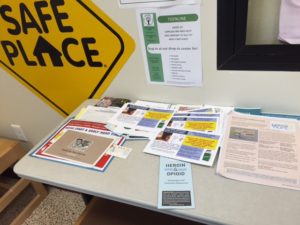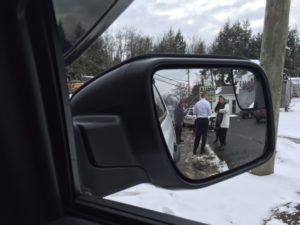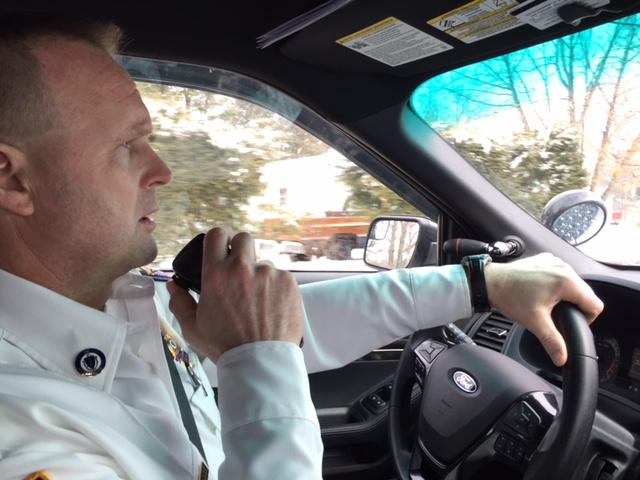Last year, the police chief of Gloucester, Massachusetts, made an unusual offer on his department’s Facebook page. Heroin addicts who come voluntarily to the station will not get arrested; they’ll get help. The Gloucester effort has gotten national press and spread to dozens of other police departments around the country.
Montague Police Chief Chip Dodge was among those inspired by Gloucester’s example.
One recent afternoon, Dodge agrees to go on a tour of Turners Falls, a village in his jurisdiction. While driving one of his officer’s marked cruisers, he notices a pamphlet on opiate addiction tucked above the visor.
“To see that, makes me pleased that it’s not stuffed away in a glove box somewhere,” he says.
Turners Falls — like many rural communities in New England — has seen a huge spike in heroin use over the past decade. Experts say the epidemic was set off by a boom in painkiller prescriptions. People often start with opiate pills, get addicted to the high, and move onto heroin, which is cheaper and easier to get.
“This was a huge drug house right here,” Dodge says, driving by an old Victorian in the downtown. “The board of health went in there and they just condemned the building.”
He waves to a couple of older women walking their dogs, and drives slowly around a man who is walking obliviously down the middle of the road.
“We must be pretty tough around here if they’ll walk down the road like that,” he jokes.
It’s against this backdrop of familiarity, and a 25 percent poverty rate, that Dodge hopes to upend the traditional relationship between police and drug users.
“When I first started as a police officer in 1992, when I thought of heroin, I thought of major crime,” he says. “You knew it was a felony, you knew it was really bad.”
Back then, if officers came across someone with heroin on them, he says, “We would have arrested them for possession of heroin.”
And it wasn’t that common. But by 2014, two years after Dodge became chief, the Massachusetts governor declared heroin addiction a state emergency. Dodge started to go to regional trainings on the opioid crisis, meeting doctors and social workers who convinced him addiction is a disease.
“Also in this position, I think people tend to trust you and share a little bit more information with you,” he says. “I’ve had people come in and sit down and talk to me and want to know how to get help. And I never would have guessed in a million years that those people were addicted.”

Last summer, Dodge posted a message to the police department’s Facebook page. He said anyone addicted to opiates, be it pills or heroin, can drop off their drugs at the station — no questions asked — and get help kicking their habit. They would not get arrested. He was borrowing directly from the police chief in Gloucester. But Dodge says his fleet of 23 officers didn’t immediately buy into this kinder, gentler police force.
“I’m not going to lie. When I first started introducing this to some of the officers, saying we’re going to try to get people help, I got some pretty funny looks,” Dodge says.
“Because it kind of goes against everything that a cop was taught — you break the law, you go to jail,” says Sgt. Leon Laster, a 17-year veteran of the Montague police force. Laster has made arrests for cocaine, crack, heroin, not to mention property or violent crime that can go along with the drug trade.
“Cops don’t like change, and when I say that, what I mean is, a lot of things change,” Laster says. “It’s not really a great time to be cops, and this is one more thing where it’s like, ‘Okay, are they tying our hands so we can’t do our job? What is this about?’ So it was new to us.
But Laster — who’s wearing a Mike Tyson T-shirt; it’s his day off — says the local police culture has become more empathetic under Dodge’s leadership, at least towards addicts.
“When you actually sit back and look at it, it’s a great idea,” he says. “My only concern, did we have services in place before we started advertising?”
Not really, says Chief Dodge.
“When somebody does have a problem, we want to be able to call up and get them a bed,” Dodge says. “Right now, all I can do is give them a whole bunch of ideas.”
That’s a lot different than Gloucester, which reports getting 400 addicts into treatment since starting its program. Dodge says the Montague police have been much less successful. Since there are so few treatment options in this mostly rural county, he says all they can really offer is a ride to the emergency room. The state is planning to open a 64-bed treatment center soon in neighboring Greenfield, but Dodge says he’s skeptical it will meet local demand.
“If it was my family member, I would drive them right to Gloucester [Police Department] and pull in and say, ‘Help,'” Dodge says. “Because they have the resources, they have the plan.”
He wouldn’t be the only one. Gloucester’s police chief Leonard Campanello says 60 to 70 percent of the addicts asking his department for help come from outside the city, and some outside the state. So he set up a nonprofit to help other police departments launch similar programs around the country – 60 have signed up so far.
And Campanello says, despite Chief Dodge’s experience,”There are plenty of treatment options out there. It’s a matter of connecting people with that.”
And knowing where to look, including among outpatient or day-programs.
“I think you have to start looking outside of your own community,” Campanello says. “We don’t place anybody in Gloucester. We don’t have a facility. We have an emergency room. We never take anyone there.”
Some Massachusetts police departments are being even more proactive than Gloucester. Northampton recently announced a new team that would seek out addicts and try to get them into treatment. Chief Chip Dodge is not there yet. He says he’s still working on building trust between addicts and police in Montague.
On our ride through town, Dodge comes upon a woman stumbling along a busy road, apparently intoxicated from something.
“Hi, How are you? You okay?” he calls out, before getting out of the car.

The woman tells him she’s coming off drugs from the dentist and doesn’t need help. A quick call to the station reveals she’s had many run-ins with police, but Dodge instructs an officer to just wait with her until a friend picks her up.
A few years ago, he says, this might have been a much more tense interaction.
“We do arrest, don’t get me wrong, especially large amounts that — you’re the dealer or whatever,” Dodge says. “We don’t really have a whole lot of sympathy for that person. But we do look into the circumstances a little more. If you find somebody with some heroin or something, we like to know the story. Why?”
Compassionate police or not, Dodge says the opioid crisis is getting worse — his officers respond to at least one overdose a month. And while he won’t arrest anyone asking for help, he has noticed that sometimes the only thing that makes an addict want to stop using is time in jail.
